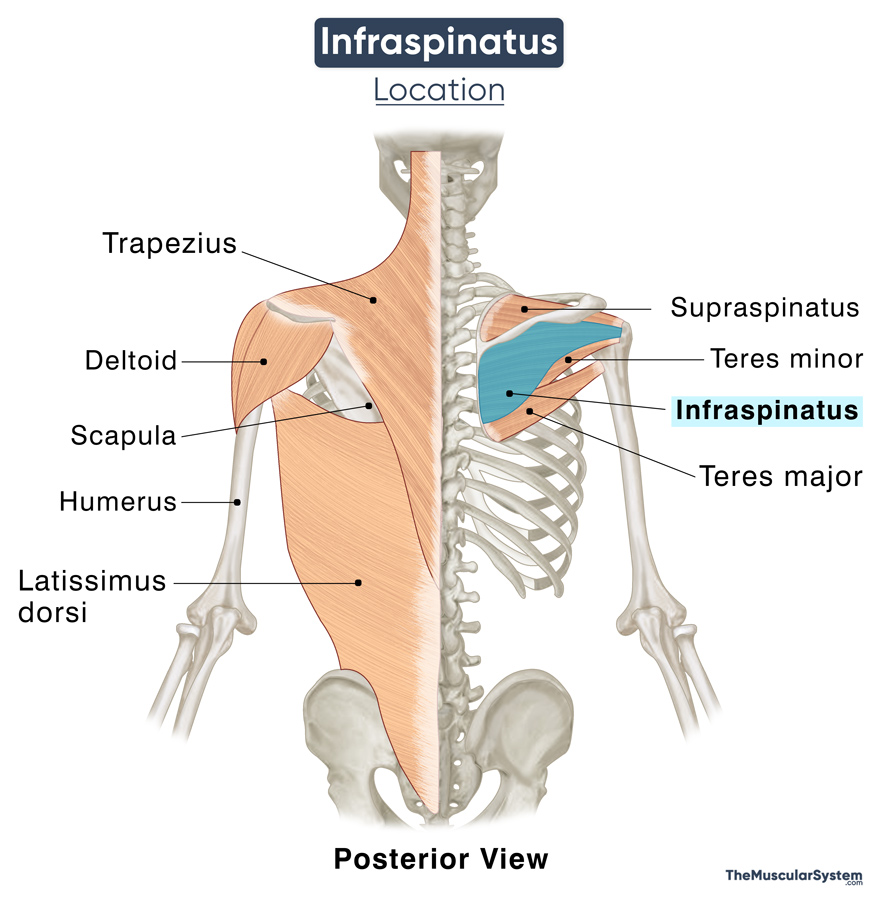Infraspinatus
Last updated:
05/05/2023Della Barnes, an MS Anatomy graduate, blends medical research with accessible writing, simplifying complex anatomy for a better understanding and appreciation of human anatomy.
What is the Infraspinatus
The infraspinatus is one of the four rotator cuff muscles located at the back of the shoulder. The thick triangular intrinsic muscle lies over most of the dorsal surface of the scapula, helping with rotating the arm.
Anatomy
Location and Attachments
| Origin | Infraspinous fossa of scapula |
| Insertion | The middle surface of the greater tubercle of humerus |
The muscle’s name derives from its location on the infraspinous fossa, a convex triangular surface on the dorsal side of the scapula. The muscle occupies three-fourths of the fossa’s surface on the medial side, where it originates directly with strong muscle fibers. Some tendon fibers originate from the ridges on the infraspinous fossa.
The muscle belly narrows down to form a single tendon, running over the border of the scapula, then coursing diagonally towards the humerus to insert into the greater tubercle. Some part of the muscle also inserts at the back of the glenohumeral joint capsule.
Relations to Other Muscular Structures
The infraspinatus lies deep to the trapezius muscle and partially beneath the deltoid and latissimus dorsi. It is bound by the supraspinatus above and the teres major and minor below and on the medial side. The infraspinatus and supraspinatus muscles are considered a single functional unit due to their relative orientation, separated only by the scapular spine.
The muscle runs almost parallel to the teres major and minor muscles, with the infraspinatus fascia keeping them separate.
As it crosses the glenohumeral or shoulder joint, the infraspinatus tendon is separated from the shoulder joint capsule by the infraspinatus bursa.
Functions
| Actions | Lateral rotation of the arm; stabilizing the shoulder joint |
Since it is one of the four rotator cuff muscles, it works with the other three, namely the supraspinatus, teres minor, and subscapularis, to stabilize the shoulder joint. It also helps in moving the arm.
Stabilizing the shoulder: When the arm is raised overhead, infraspinatus, along with teres minor, acts against the upward pull of the deltoids to prevent the humerus from getting displaced in that direction. It keeps the head of the humerus in place within the glenoid cavity. This action also prevents any coracoid process impingement.
Performing external rotation: It is one of the strongest lateral rotators of the arm, helping it rotate or twist outward (laterally) at the shoulder. Its insertion into the humerus at the medial portion of the greater tubercle makes it possible for the muscle to exert an external rotational force on the bone. This force becomes even stronger with help from the similar force exerted by the teres minor, which inserts into the inferior portion of the humerus.
Infraspinatus also helps raise the arm overhead to hit something, such as when hitting a volleyball.
The primary antagonists of infraspinatus are the subscapularis, pectoralis major, and latissimus dorsi.
Innervation
| Nerve | Suprascapular nerve (C5 and C6) |
The muscle shares its nerve supply with the supraspinatus. The suprascapular nerve branches off the superior trunk of the brachial plexus.
Blood Supply
| Artery | suprascapular artery and circumflex scapular artery |
References
- Infraspinatus Muscle: Action, Insertion & Origin: Study.com
- Infraspinatus: TeachMeAnatomy.info
- Anatomy, Shoulder and Upper Limb, Infraspinatus Muscle: NCBIi.NLM.NIH.gov
- Infraspinatus Muscle: RadioPaedia.org
- Infraspinatus Muscle: KenHub.com
- Infraspinatus Muscle – Attachments, Actions & Innervation: GetBodySmart.com
- Infraspinatus: Rad.Washington.edu
Della Barnes, an MS Anatomy graduate, blends medical research with accessible writing, simplifying complex anatomy for a better understanding and appreciation of human anatomy.
- Latest Posts by Della Barnes, MS Anatomy
-
Geniohyoid
- -
Digastric
- -
Stylohyoid
- All Posts







